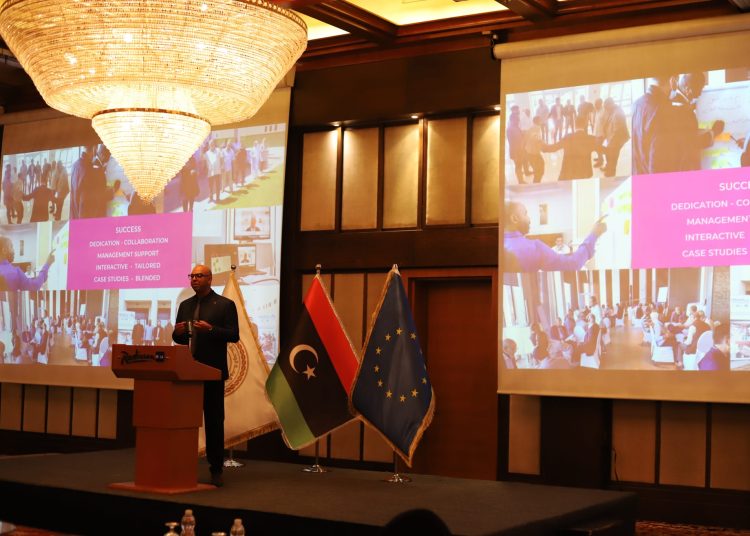The activities of the Libya Al-Maharat (Libya Skills) programme for the development of technical and vocational education and training (TVET) in Libya were concluded at an event held in Tripoli yesterday.
The event was attended by the Minister of Technical and Vocational Education, Yakhlef Saeed Al-Sifaw, Catherine Wilde, Deputy Ambassador of the United Kingdom, Federica Petrucci, Deputy Director of Cooperation at the European Union Delegation to Libya, and in the presence of several Representatives of the embassies accredited in Tripoli and directors of intermediate technical institutes in the regions.
Speaking at the event, Minister Al-Sifaw, stressed the importance of such projects and the creation of distinguished partnerships with international institutions, praising the importance of cooperation and coordination with the European Union mission in Libya to create new projects related to technical and vocational education.
For her part, Federica Petrucci, Deputy Director of Cooperation at the European Union Delegation to Libya, affirmed the continuation of technical support to Libya, especially the technical and vocational education sector, in successful cooperation with the Ministry of Technical and Vocational Education.
Meanwhile, speaking exclusively to Libya Herald, Dr Ali Al-Sayeh, Director of Technical Colleges Department and Chairman of the Advisory Committee for the project, said that despite the circumstances that faced the project, which began in 2019, the success in completing it according to the target was an achievement. He praised the efforts of scientific and technical expertise from both sides to overcome them and to continue to develop technical education.
Benefiting from the lessons of the project
He referred to benefiting from the lessons of this project, which was implemented in all technical and vocational education offices and institutes in the various Libyan regions, and looked forward to a clear national vision to benefit from such international projects in the development of technical and vocational education.
Cascade training and competency-based training (CBT)
Al-Sayeh added that the cascade training courses of the project for the development of technical and vocational education in Libya have achieved a remarkable development in the performance of staff and faculty members in technical and technical institutes. This was especially so regarding dealing with the basics of competency-based training (CBT) and the acquisition of a method of thinking, practice and systematic application of basic principles, continuous evaluation and quality assurance of competency-based evaluation.
Pointing out that within the activities of the Programme for the Development of Technical and Vocational Education in Libya, a workshop was organized to develop administrative leaders in intermediate technical institutes, attended by several directors of technical and vocational education offices in the regions and directors of intermediate institutes from all Libyan cities.
The Al-Maharat project is funded by the EU and delivered by the British Council in partnership with the Ministry of Technical and Vocational Education (MoTVE).
Libyan Technical (TVET) institutes visit UK – part of Almaharat project (libyaherald.com)










